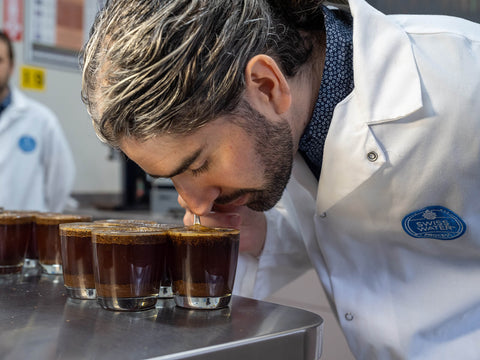Join us for a conversation with the team Swiss Water, a proud partner of Standart Issue 24.
Are there particular coffees suited to the Swiss Water® Process, or can any coffee be decaffeinated while maintaining its natural characteristics?
Absolutely any coffee can be decaffeinated with our process (though we are partial to the results we get with Arabica beans, which is what a lot of people prefer drinking in caffeinated form, too). The Swiss Water® Process is capable of successfully decaffeinating very high quality coffees. Although it’s an extreme example, in 2020 we were sent a very expensive Colombian Gesha to decaffeinate for use in a national barista championship competition. We were honored to be trusted with this calibre of coffee but also knew that our process would deliver a great result (as did the barista competitor, who would be unlikely to gamble with such a valuable coffee).

On the regular, we offer a rotating assortment of special coffees through our Small Batch Series range. These are coffees with a special story—from an origin standpoint and in their taste and quality; they are limited in availability and typically sell out quickly. They have also included some lesser-seen origins for decaf, like Burundi and India. We hear great feedback from coffee lovers who’ve long wanted to see this kind of variety in coffee origins and unique, smaller lots—but in decaf.
While we source and sell green coffee we’ve decaffeinated already, our customers also send us some very high quality coffees to decaffeinate, and we are proud to claim a large number of high-end roasters as Swiss Water® Process partners. (However, a coffee doesn’t have to be fancy to get the benefit of our process—it’s clear from the wide range of folks we partner with that our method shines with any style of coffee.) Besides specialty and boutique roasters, we are grateful to also have several large commercial roasters among our customers, who trust us to maintain the characteristics and preserve the value of the coffees they send us.
And—yes!—it is surely possible to drink a decaf that has all of the characteristics you’d expect in a specialty coffee! We frequently conduct blind cuppings of pre- and post-decaffeination coffees (same lot) across the industry and we find that many well-trained tasters cannot discern the Swiss Water® Process decaf from the non-decaf—although we recognize that the terms “decaf” and “maintaining the coffee’s natural characteristics” haven’t always gone hand-in-hand.
'While we source and sell green coffee we’ve decaffeinated already, our customers also send us some very high quality coffees to decaffeinate, and we are proud to claim a large number of high-end roasters as Swiss Water® Process partners.'
A look back at the history of decaf can help to explain. Traditional and predominant decaffeination methods include methylene chloride and ethyl acetate, both of which use added chemicals and therefore neither is particularly good at preserving the inherent characteristics of coffee (and in fact, ethyl acetate treatment, often called “natural”, is known for imparting a sweet taste not naturally found in the beans). In turn, roasters—needing to furnish a decaf option to their customers—would send low-quality beans for decaffeination and the coffee drinker’s decaf experience wasn’t all that great. But the commercialization of chemical free processes in the late 1900s, coupled with more recent and ongoing efforts to improve the quality of these same processes, has really changed the paradigm for decaf. We all know the “why bother” and “death before decaf” declarations, but to drink decaf is to truly love coffee because it’s entirely about taste.

What allows the Swiss Water® Process to so gently decaffeinate coffee?
We use a decaffeination solution that we call Green Coffee Extract (or GCE). Our GCE is really special because it’s just coffee and water, and so it treats coffee particularly well. We create it internally by soaking green coffee in pure water (this occurs only once for each production line; GCE is a sustainable, living solution). It contains all of the soluble solids naturally occurring in green coffee, minus the caffeine (which is extracted using our caffeine-targeting carbon filters). To decaffeinate coffee for customers, green beans are soaked in the GCE, and the imbalance of caffeine between the coffee and the GCE causes it to migrate out of the bean and into the GCE through diffusion. Our process is net extractive which means that no soluble solids—other than caffeine—migrate between the bean and our Green Coffee Extract. To put a finer point on it, nothing is introduced to the coffee throughout our process that is not naturally found it in when we receive it.
'Our coffee is decaffeinated until it is 99.9% caffeine free. To decaffeinate a coffee to 100% caffeine free would mean removing the flavor that makes coffee coffee (and likeable!). We are proud to be able to maximize caffeine removal while also maximizing taste.'
A second key factor is our team’s deep knowledge of coffee at a scientific level. We have a lot of coffee lovers on our team who study coffee inside and out because they want the decaf coffee experience to be the best it can be. As a result, we understand how each coffee is different, taking into account size, density, and origin characteristics. How each coffee will react to and be optimized by our process is different (for example, it is more difficult to remove caffeine from a hard bean). We accordingly adjust our process where needed—across time, speed, temperature, and other factors—to protect the internal structure of the bean, which is how its characteristics are preserved. We use constant data feedback throughout our process to optimize its performance and combine that with the expertise of our Q Graders who sample each batch of coffee pre- and post-decaffeination to confirm that our process has done its job well.

And for the person enjoying the final cup, we like to think that not only has our “gentle” process been better for their taste experience, we’re happy they can choose an option that doesn’t introduce added chemicals to their coffee routine.
Exactly how much caffeine can the Swiss Water® Process remove from coffee?
Our coffee is decaffeinated until it is 99.9% caffeine free. This level is compliant—and sometimes greater than—standards around the globe, which vary by geography. For example, the European Union requires that roasted decaf contain no more than 0.1% caffeine. The U.S. Food and Drug Administration requires that coffee have 97% of caffeine removed to conform to standards. All decaffeinated coffees have small residual amounts of caffeine, and typically falls in the 5-15mg per cup range, which varies depending on factors like dosing and brewing method. To decaffeinate a coffee to 100% caffeine free would mean removing the flavor that makes coffee coffee (and likeable!). We are proud to be able to maximize caffeine removal while also maximizing taste.
This interview was published in proud partnership with Swiss Water.



